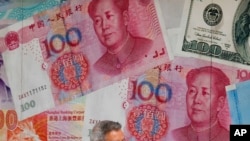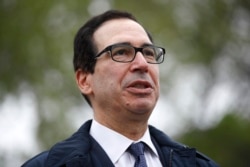For two days in a row last week, amid coronavirus-related market meltdowns, a group of stocks on China’s main exchange moved so significantly that they triggered automatic circuit-breakers designed to halt trading. But trading was suspended not because the stocks plummeted. It was because they soared.
The explosive rally of digital currency-related stocks followed news that after several years of anticipation, China’s government released a timeline for rolling out its new digital currency in four cities.
In the next month, government workers in these cities will use a smartphone application to receive at least a portion of their paychecks in the form of a digital payment, marking a milestone on the path toward the world’s first digital currency system by a major central bank.
To some experts, the digital currency could represent a serious threat to an American asset that has reigned unchallenged for decades: the U.S. dollar.
The dollar's supremacy
U.S. dollars reign supreme in the global economy. Nearly 90 percent of international transactions in 2019 were in U.S. dollars, and about 60 percent of all foreign exchange reserves in the world are in U.S. dollars, compared with the Chinese yuan, which makes up only 2 percent of global payments and reserves.
The dominance gives Washington enormous power — even in issues that have little to do with finance. Because a linchpin of the global financial system is in New York, where dollar-based payment systems process trillions in transactions, the U.S. government has global muscle in enforcing sanctions.
With so much of the world dependent on U.S. banking, it can mean that even companies with no U.S. operations still depend on the American financial system.
“Even a company that has basically no trade in the United States, their banks do,” Jarrett Blanc, a senior fellow at the Carnegie Endowment for International Peace, told The Atlantic last year.
Because of that unique power, organizations like Iran’s Islamic Revolutionary Guard Corps and countries like North Korea feel the bite when they are sanctioned by Washington.
Domestically, the dollar has been a vital asset to Americans, too, especially in times of crisis. As demand for U.S. dollars has increased during the current coronavirus pandemic, the U.S. has been able to borrow at relatively low interest rates, helping to finance its rescue.
“This is an important advantage for the U.S. in responding quickly to a crisis that policymakers in some other major economies lack," Ross Darrell Feingold, a lawyer and political risk analyst who has more than 20 years’ experience advising clients on doing business in Asia, told VOA.
But this is a disadvantage for other countries whose currencies fluctuate in relation to the U.S. dollar, making long-term budget forecasting more difficult.
As John Connally, President Richard Nixon's Treasury secretary, famously told a group of world finance ministers in 1971: “The dollar is our currency, but it’s your problem.”
China challenges
For decades, the governments of China, Russia and many others pushed hard to create an alternative reserve currency system. But none has had much success.
China's currency is basically only being used in some Asian countries, and in some transactions, such as buying crude oil from Iran, because U.S. sanctions make it difficult for Iran to accept payments in dollars.
But despite China’s complaints over the dollar’s supremacy, Beijing has built its wildly successful economy around it. China gains most of its dollars by exporting goods to the United States. Chinese companies take those dollar payments and exchange them with the central bank for Chinese yuan to pay their workers. The central bank keeps those dollars in reserve. As of March, China was estimated to be holding $3 trillion worth of U.S. currency.
Starting in 2014, China saw digital currencies as a way of shifting away from U.S. dollars. It has since made advancing digital currency technology a key national strategic goal.
National economic plans in 2016 mention advancing blockchain, the technology behind popular digital currencies such as Bitcoin.
President Xi Jinping told his Politburo in October 2019 that China must accelerate the development of blockchain.
Digital transactions expand yuan’s reach
Right now, when two companies that use different currencies create a business contract, the value of the transaction is usually denominated in dollars. This requires the companies to “hedge” the risk that the value of their currency will change, thus changing the value of the contract. That frequently means they need a bank to act as an intermediary, but that may not be the case in the near future.
Michael J. Casey, chief content officer at CoinDesk, a news site specializing in digital currencies, said a foreign importer and a Chinese exporter could mutually instruct computers in a blockchain network to place a renminbi-denominated payment into a kind of digital lockbox as a new way of doing business.
"This decentralized escrow system could let foreign businesses strike trade deals without requiring dollars to hedge their exchange rate risk," Casey said in an interview with VOA.
Jeremy Allaire, CEO of Circle, a peer-to-peer payments technology company, said China’s digital currency could lead to wider global use of the yuan.
“This becomes a mechanism by which [the Chinese yuan] can be used in everyday transactions all around the world,” Allaire said on the U.S. business network CNBC in September 2019, when China announced that it would launch its own digital currency to “protect” its foreign exchange sovereignty.
Experts pointed out that China’s proposed digital currency bypasses the Western banking system, including SWIFT, the Belgium-based Society for Worldwide Interbank Financial Telecommunication, that enables financial institutions worldwide to securely send and receive information about transactions.
'National security issue’
Last July, U.S. Treasury Secretary Steven Mnuchin said in a White House briefing that cryptocurrencies have already been exploited to support billions of dollars of illicit activity.
“This is indeed a national security issue,” Mnuchin said.
To preserve the dollar’s status, analysts have been warning recently that the United States cannot afford to let China get ahead on cryptocurrency.
Tim Morrison, a senior fellow at the Hudson Institute who served as a special assistant to President Donald Trump, told VOA that he believes the prospect of Beijing “dominating this emerging financial technology should be alarming.”
In the United States, digital currencies are still in the planning stages. Facebook announced last summer a global digital currency called Libra, but it is still trying to win approval from regulators.
Earlier in April, U.S. lawmakers introduced a bill that would authorize the Federal Reserve to create “Digital Dollar Account Wallets" called “FedAccounts” to distribute stimulus checks to business and citizens.
Although both efforts are small, there is a lot at stake, Casey, of CoinDesk, said.
"A China victory in the digital currency race would have profound negative effects for the U.S., and Western capitalism generally,” he said.
Casey said even with a head start, it is still a long shot for China to win the battle. But he said, "If the U.S. doesn’t catch up soon, it’s going to lose.”
Michael Hirson, an analyst at Eurasia Group, in an email to VOA also said that while the development of a sovereign digital currency by China does not pose a direct threat to the dollar’s status, Washington should not take its reserve currency status for granted.
"Over the long term, a digital currency could potentially help China promote internationalization of the RMB [renminbi]," said Hirson, who served as chief representative of the U.S. Treasury in Beijing.
Although it is impossible to predict whether or when the dollar will be dethroned, an opinion piece reprinted by China's Commerce Ministry on its official website six years ago, when China began studying the development of a state digital currency, may offer a clue: "RMB will replace USD in the next 15 years," the site said.
It is a top strategic priority for China, and it seems willing to wait.












